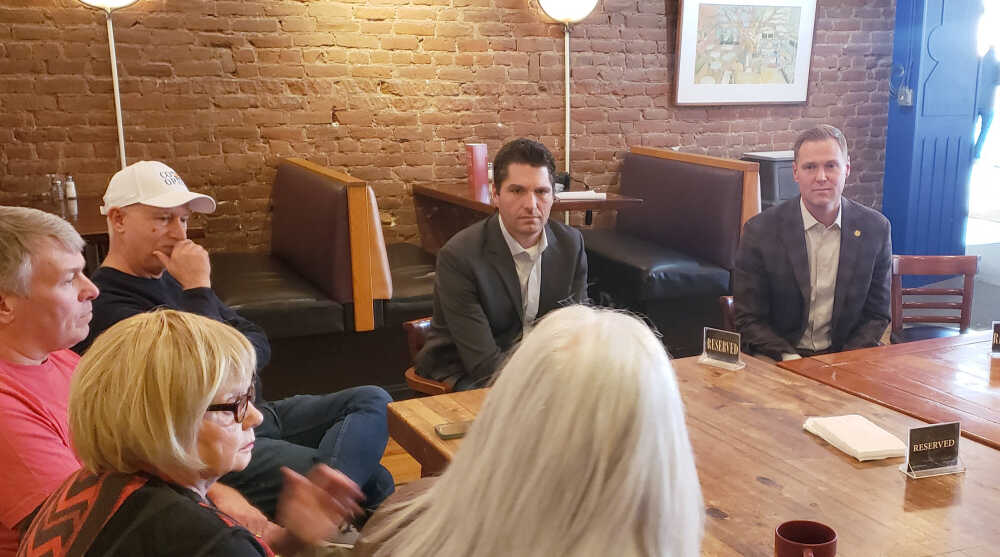Gubernatorial candidate seeks insight from local residents

McCOOK, Neb. – A Republican gubernatorial candidate, along with his running mate, met with business leaders in McCook on Friday afternoon in and effort to learn about issues that are important to southwest Nebraska voters.
State Sen. Brett Lindstrom of Omaha chose Dave Rippe of Hastings, Neb. as his pick for lieutenant governor. Rippe is the former director of the Nebraska Department of Economic Development.
Sen. Lindstrom said he has been traveling throughout the state getting feedback and insight from Nebraska residents. Most of the hour-long meeting consisted of Lindstrom and Rippe answering questions and listening to concerns from the gathering about various policies, including education, school funding, taxes, and workforce and economic development.
Sen. Lindstrom has represented District 18, a portion of north-central Omaha, since 2014. He will be term-limited out of the Nebraska legislature in 2022.
Lindstrom said he believes in a “bottom-up” government, where local leaders have the responsibility of making decisions that affect their constituents’ lives. “It’s more about how do we complement those individuals at the local level to assist them. Any time you’re closer to government and having those one-on-one conversations and interactions, the better it is for everyone.”
Lindstrom credits some of his success in the legislature with his ability to work with everyone, regardless of their political leanings, and building coalitions to get things done. “I’m not the most vocal person on the floor, and there’s a reason why I do that. There are enough senators who talk enough for everybody. It’s more about relationships.It’s having that one-on-one dialogue to address the issues before that bill ever gets to the floor.”
Lindstrom said he is taking the same philosophy of building relationships to his campaign, and ultimately to the governor’s office if he’s elected. He believes that his experience in the legislature gives him a head start in building coalitions that will affect changes on important issues, such as school funding formulas, and property and income tax relief.
Tax structure and infrastructure are important aspects of attracting and retaining workforce, Lindstrom said. Rural broadband and roads funding are two areas that he would invest in as governor. “You can’t ask young individuals to live in communities where they don’t have connectivity. It’s just not going to happen,” Lindstrom said. Other areas of concern are housing and childcare.
Lindstrom believes that his campaign has an advantage over his opponents in relating to the younger demographic of 18-to-35 year-olds. “We need to shift away from saying that Nebraska’s not for everyone and say hey, we’re a place that’s innovative.”
Discussing workforce development, Rippe told the gathering that about 30 million people move in the United States every year, and 14 percent of those people move to different states. Half of those people go to one of seven states, and “one of those seven states isn’t Nebraska”.
He said that 90 percent of population growth happens in metropolitan counties. He contends that the best option for rural areas to recruit workforce is to stop the “brain drain” and figure out the things that would encourage young people to stay in or come back to rural areas.
“I think the big opportunity for Nebraska is to understand how we build a state and communities where people can stay and people want to stay,” Rippe said. He used Norfolk as an example of a rural community that has put a lot of effort into building a community that young people want to live in.
He said selling Nebraska as the cheapest place to do business is not a value prospect that will attract business, or the workforce needed to grow the state’s economy. Communities that invest in infrastructure that attract young people will be the most successful. “No one’s coming to save us. We better figure out a way to do it ourselves,” Rippe said.
Lindstrom and Rippe said that state government can help by developing programs to assist local communities in building amenities that will attract people. Sports facilities, arts districts, vibrant downtowns, and recreational opportunities are examples of amenities that young people are looking for.
One attendee expressed concern about campaign advertising that used “buzz words” where all candidates seem to be saying the same thing. Lindstrom said that after the initial campaign of introducing himself to the entire state, the focus would shift to more substantive issues like what was discussed at Friday’s listening session.
Lindstrom joins other Republican candidates seeking the nomination for governor, including Jim Pillen, an NU Regent and Charles Herbster, a native of Falls City, Neb. who operates Herbster Angus Farms. In addition, Michael Connely, Donna Carpenter, and Lela McNinch of Lincoln; and Theresa Thiboldeau of Omaha have also filed under the Republican ticket.
State Sen. Carol Blood is the only Democrat to file for election so far, and Scott Zimmerman of Omaha is running under the Libertarian ticket.
